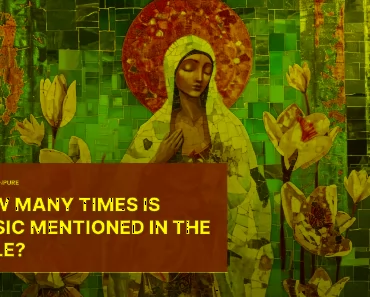
(Credits: Far Out / Aphrodite’s Child)
The open road stretches ahead of you like an artery. A chandelier of stars twinkles overhead, but you barely notice. Your heart begins to pump with a bassy quality, sending a rolling ripple through your body like your blood has turned jammy, thick with adrenaline. The rushing wind wafts the odd note up from the bag of cash on the backseat, and it flutters out of the window on a gust, confetti for the heist’s precession. Your eyes are transfixed ahead, not at the asphalt per se, but rather a sense of a fresh horizon. Then ‘The Four Horsemen’ draws to a close, your sound system breathes a sigh of relief, and you open your eyes in your golden-lit living room and take another sip of budget European lager. You’ve just had the greatest experience prog rock can offer.
666 by Aphrodite’s Child is quite a trip. It emerged in 1969 when the Greek group were looking to expand their horizons in a wholly biblical way. That’s the nature of prog, I suppose. While the symptom that often befouls it is that this search for the biblical end of music’s spectrum often leaves it bloated, 666 sees it hit a peak—it is a transportive roaring beast of a record, filled with its own rare and weird acidhead adventure; a billowing whirlwind of sound that feels about as heavy as an anvil made of antimatter.
Towards the end of 1969, a young Cypriot creative, Costas Ferris, had just finished the script for a film he called Aquarius. The director wanted Pink Floyd for the score, but they were in demand and turned down the obscure feature film, so epic it would require more attention than they could afford. So, Ferris turned to his friend, the then-unknown Vangelis from the growing Greek band. He also declined. Yet, around the same time, he liaised with Ferris about formulating a bold new concept for the forthcoming Aprhodite’s Child album. The briefing must’ve fittingly been something along the lines of, ‘It needs to be big’.
Ferris went away and thought about it and returned with two biblical possibilities, the darkness in both of which angle towards a requiem for the 1960s, as the decade’s idealism was presently being slain by the Manson Family murders, escalations in Vietnam, the tragic deaths at Altamont and the relative failure of Woodstock to change the world—as if one concert ever could. His first idea was the passion of Jesus Christ as seen through the prism of pop culture’s unfurling calvary—a concept that David Bowie would just about inadvertently borrow for Ziggy Stardust. However, this idea didn’t stick for Aphrodite’s Child, it was a little too American for them.
Instead, Vangelis shook hands on his second idea, this homily of ’60s whirlwind culture coming to a close as seen through the Revelation of Saint John, something the Greeks fittingly call simply, Apocalypse. It is the last chapter of the New Testament in the bible. It sees the Antichrist rise and divine judgement bid adieu to the end of the world as good triumphs over evil, establishing a new heaven of godly salvation. It is the highest high of light overcoming darkness—a deathly Armageddon of hope. This was the basis of what would become 666.

While Vangelis insists that he was never spiritual, it is easy to see how Aphrodite’s Child saw the creative appeal of such a narrative. After all, they had recently had to flee a far-right regime that rose up in Greece, prompting them to relocate to Paris, where they absconded to Europa Sonor Studios and bedded in to begin work on the astounding album. They were Vangelis, Demis Roussos, Lucas Sideras, and Silver Koulouris—four extremely hairy, talented men filled with a sense that they were just getting started at the end of all ends.
Not only did they see that idealism was being put to the sword by impacting world events, but they also must’ve felt that the days of the band were dwindling. Vangelis felt creatively stifled as a composer in the presence of three peers who were worthy of equal billing in the traditional group setting. He was also keen to become more of a studio band like The Beatles before them. However, it was touring that was keeping them financially afloat. So, lingering somewhere in the rafters of the record’s refrains is a farewell of sorts to Aphrodite’s Child—the launchpad of some of Greece’s finest musical sons.
That predicament and the position that many Greeks found themselves in around the world led to a sense that every note counted. Koulouris, for instance, had been forced into the military in 1968, so when he eventually joined the band in Paris a year later, he poured his embittered soul into his playing. Gone was the soft commercial balladry of previous records, and in its place was a virtuoso channelling Jimi Hendrix into a style of playing writ large with the vigour and pomp of a vengeful man recently wronged.
This in itself was also indicative of the fact Aphrodite’s Child were subconsciously aware that they were singing their own suicide note. They had summoned the actor Irene Papas, a star known for her bold beauty, to parody the orgasm that Jane Birkin had delivered in a pop hit with something grittier and more profound, the other second coming of Christ, if you will. All of this led to the label taking hold of what would now be $90,000 worth of work and ridiculing it as pompous pornography that wouldn’t sell and would spell the end of the band. Mercury Records demanded censorship and refinement. Vangelis refused to budge. 666 would remain as it was.
Perhaps in a bid to bolster its backing, Vangelis would play the master tape to Salvador Dalí and Amanda Lear at a Parisian loft party. They both listened in awed silence, perhaps picturing their own high-speed getaway scene, only more surreal. But the only PR quote that this summoned from the Spaniard was, “It’s a stone song!” Quite what he meant is known only to himself—as is often the case with the moustachioed painter who once bit the head off of a bat. However, his comparison to Antoni Gaudí’s grandest work, the Sagrada Familia in Barcelona, a cathedral whose mission statement reads, “It is a work that is in the hands of God and the will of the people,” was far more lucrative press.
Maybe this forced Mercury to budge, or maybe they just realised that Vangelis wouldn’t, but suddenly, in 1972, the record would linger no longer, and it was finally released. Sadly, it was a little too late. The band had all but folded and practically faded at that stage. The 1960s had long since died, and the sermon was less timely than it could’ve been. Prog had stolen itself away from the likes of Sgt Pepper’s that helped to spawn it and indulgently wandered towards its most flabby and flashy sonic flatulence. So, 666 failed to have the impact it rightfully deserved.
But thankfully, its brilliance persists, and with the newly issued boxset, the 50th-anniversary edition released by Vertigo, 666 may well have its second coming, causing cash from heists to flutter out of imagined sports car windows the world over, serving another timely tale of revelation in an age of culture gone awry.
Related Topics







